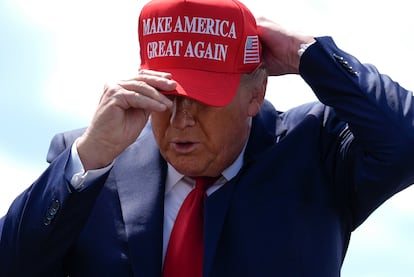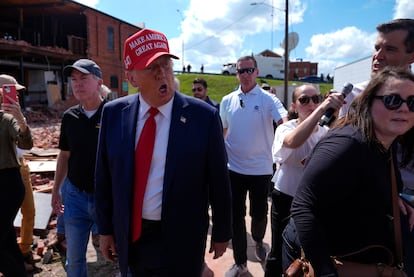A Trump plan for the Middle East
The Greater Middle East conceived by Bush and his neocons, where democracy was to come from Iraq, is back. But now it is Israel that is doing the dirty work, instead of the US

Donald Trump had a plan for the Middle East, but he didn’t even know what it was. Benjamin Netanyahu, an old friend of the Kushners and especially of their son Jared — Ivanka’s husband and the president’s son-in-law — was very familiar with it. Trump was only interested in the result: a photo in the White House garden where he could solemnly sign a document with Arab and Palestinian leaders, as previous presidents had done. And then the Nobel Peace Prize, for which he had at his service a gray, far-right Norwegian lawmaker who was willing to nominate Trump, as he had done on two previous occasions with similar success: once for his failed attempt to disarm North Korea, with his three summit meetings and his love letters to Kim Jong-un; the other, for the Abraham Accords, so called despite presidential insinuations that they should be called the Trump Accords.
The plan began to be implemented before it was even named, once Jared Kushner’s father-in-law entered the White House. Trump’s first international trip was not to Mexico and Canada, as per tradition, but to Israel and Saudi Arabia. Washington cut off its financial aid to the Palestinian Authority, closed its office in the federal capital and moved its embassy to Jerusalem. The White House also recognized Israeli sovereignty over the occupied Syrian territories in the Golan, which Netanyahu aptly named the Trump Heights.
These were minor details compared to the momentous step: the first superpower broke the multilateral nuclear agreement with Iran, which had achieved the halt of its uranium enrichment program, essential material for the manufacture of the atomic bomb, in exchange for lifting the embargo on Iranian assets frozen in Western banks in compliance with United Nations sanctions.
It was not Trump, but Kushner who had a vision for the Middle East, patiently instilled by Netanyahu during years of cultivating a friendship with the young millionaire and now relative of the former president. A security alliance of Sunni Arab countries had to be built, a kind of NATO of the Middle East, against the “axis of resistance” formed by Iran.
Territorial problems were to be resolved in the way real estate tycoons resolve them: with huge investments and deals, even greater profits and, of course, expropriations, which always affect the same people. This gave rise to the Abraham Accords, by which the United Arab Emirates, Bahrain, Sudan and Morocco recognized Israel, and the United States showered the signatories with gifts of arms or diplomatic concessions (the recognition of Moroccan sovereignty over Western Sahara for Mohammed VI, among others) and left the Palestinians with nothing, not even peace negotiations.

Still incomplete, lacking the Saudi signature, the first steps of the Abraham Accords were enough for Hamas to launch its bloody expedition of October 7 in the Negev. The 2025 Program, drawn up by the Heritage Foundation in preparation for Trump’s second term, clearly explains their meaning: “They signal the end of the centrality of the Arab-Israeli conflict that has paralyzed U.S. relations with the region, now focused exclusively on Iran, which is the main threat to Washington.” After the Gaza war, it is time for the Lebanon war, and then on to Iran, exactly what Netanyahu has been preaching for 30 years, while Washington turned a deaf ear.
A huge paradox: the Greater Middle East conceived by Bush and his neocons is back, where democracy was to come from Iraq and, as in Iraq, through war and regime change. But now it is Israel that is doing the dirty work directly, instead of the United States. If Kamala Harris wins, she will ask Netanyahu for something in return. If Trump wins, the Israeli leader will not even need permission to complete the plan to the extent that suits him, since it the plan belongs to both.
Sign up for our weekly newsletter to get more English-language news coverage from EL PAÍS USA Edition
Tu suscripción se está usando en otro dispositivo
¿Quieres añadir otro usuario a tu suscripción?
Si continúas leyendo en este dispositivo, no se podrá leer en el otro.
FlechaTu suscripción se está usando en otro dispositivo y solo puedes acceder a EL PAÍS desde un dispositivo a la vez.
Si quieres compartir tu cuenta, cambia tu suscripción a la modalidad Premium, así podrás añadir otro usuario. Cada uno accederá con su propia cuenta de email, lo que os permitirá personalizar vuestra experiencia en EL PAÍS.
¿Tienes una suscripción de empresa? Accede aquí para contratar más cuentas.
En el caso de no saber quién está usando tu cuenta, te recomendamos cambiar tu contraseña aquí.
Si decides continuar compartiendo tu cuenta, este mensaje se mostrará en tu dispositivo y en el de la otra persona que está usando tu cuenta de forma indefinida, afectando a tu experiencia de lectura. Puedes consultar aquí los términos y condiciones de la suscripción digital.









































